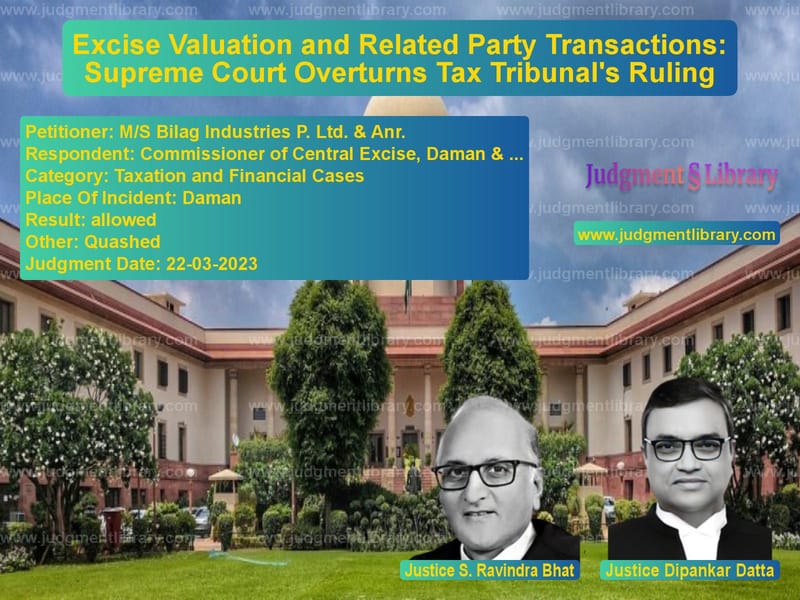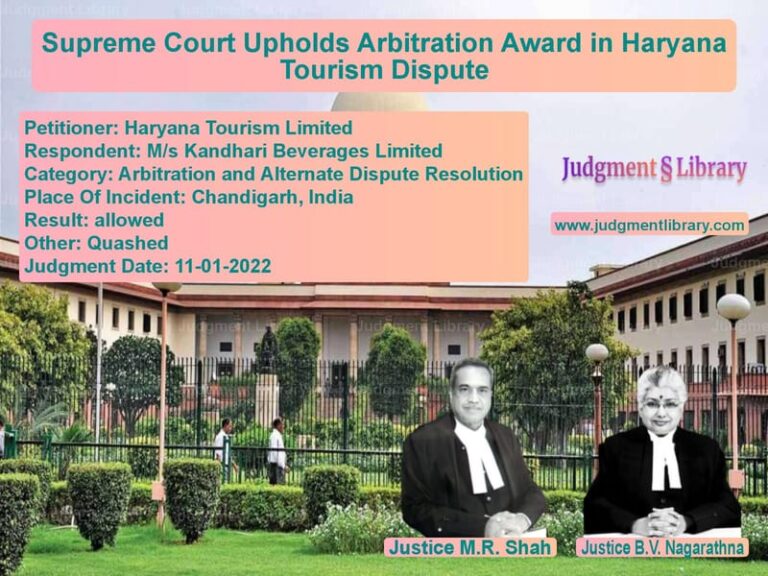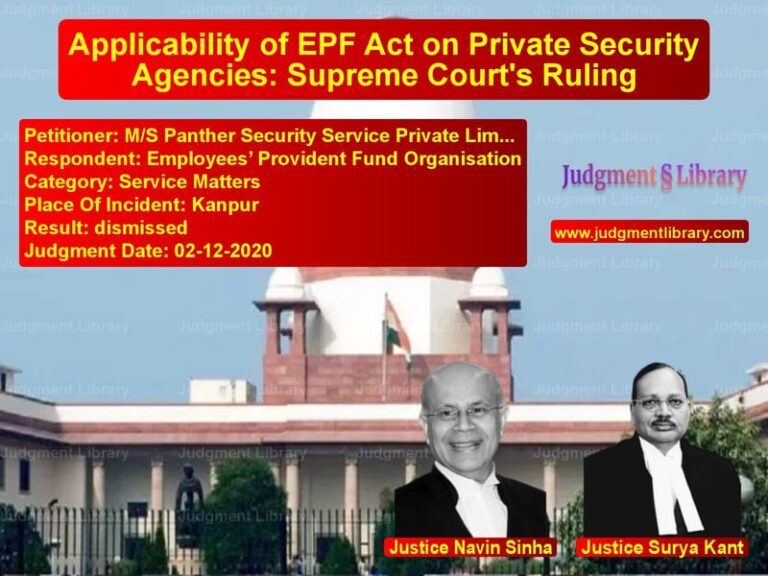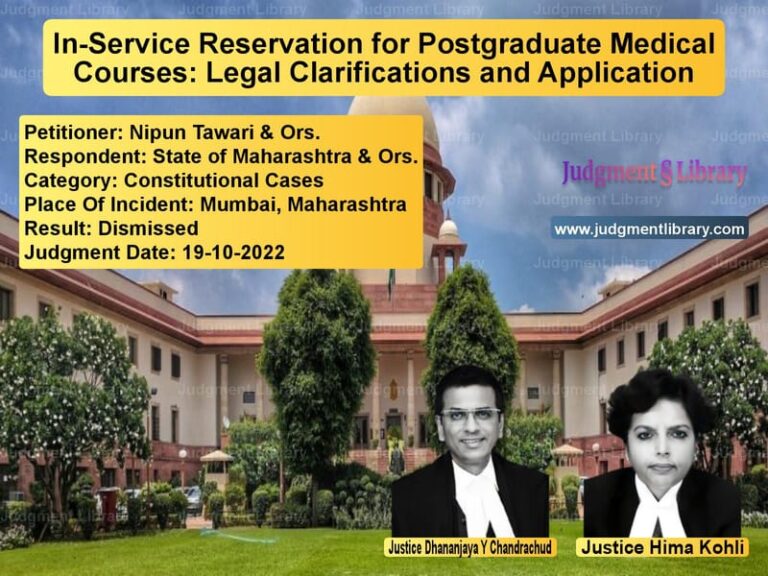Excise Valuation and Related Party Transactions: Supreme Court Overturns Tax Tribunal’s Ruling
The case of M/S Bilag Industries P. Ltd. & Anr. v. Commissioner of Central Excise, Daman & Anr. revolves around the interpretation of the term “related person” under the Central Excise Act, 1944. The key question was whether the price at which the appellant sold its products to a buyer should be considered a transaction between related persons, thereby impacting the assessable value for excise duty.
Ultimately, the Supreme Court ruled in favor of the appellant, overturning the decision of the Customs, Excise and Service Tax Appellate Tribunal (CESTAT). The Court held that the appellant and its buyer were not related persons under the meaning of Section 4(4)(c) of the Central Excise Act. This ruling clarifies the application of excise valuation rules in cases involving joint ventures and related entities.
Background of the Case
The case involved M/S Bilag Industries Ltd. (BIL), which was previously known as Mitsu Industries Ltd. The company was formed as a joint venture (JV) with AgrEvo GmbH, a foreign company, for the research, manufacture, and sale of agrochemicals. Under the joint venture agreement (JVA):
- BIL transferred its non-pyrethroid business to another entity.
- AgrEvo SA acquired 51% of BIL’s shares, which later increased to 74%.
- BIL agreed to manufacture specific agrochemical products, such as Esbiothrin, and sell them to AgrEvo SA and its Indian subsidiary, Aventis CropScience (India) Ltd.
The dispute arose when the excise authorities claimed that:
- BIL’s sales to Aventis CropScience (India) Ltd. were not at arm’s length but were transactions between related persons.
- The price at which Aventis CropScience (India) Ltd. sold the products to end customers should be used as the assessable value instead of the transaction value.
- Excise duty was evaded due to under-valuation.
As a result, the department raised a demand of Rs. 1.68 crore as excise duty for a specific period and additional demands for other transactions.
Arguments by the Parties
Arguments by the Appellant (M/S Bilag Industries P. Ltd.)
The appellants, represented by their legal counsel, argued:
- Transactions between BIL and Aventis CropScience (India) Ltd. were on a principal-to-principal basis and at arm’s length.
- There was no mutual business interest between the two entities beyond the normal buyer-seller relationship.
- The price at which BIL sold its products was determined based on a supply agreement that included a cost-plus pricing mechanism.
- The mere fact that AgrEvo SA held shares in both BIL and Aventis CropScience (India) Ltd. did not automatically make them related persons under the law.
- Excise law requires mutual interest in business for two parties to be considered related, which was absent in this case.
Arguments by the Respondents (Commissioner of Central Excise, Daman)
The excise department defended its claim, stating:
- BIL and Aventis CropScience (India) Ltd. were subsidiaries of the same parent company, AgrEvo SA, establishing a related person relationship.
- The business structure ensured that Aventis CropScience (India) Ltd. would receive the products from BIL at a lower price and then sell them to end customers at a higher price.
- The agreements and licensing arrangements between the entities showed significant interdependence.
- The financial dealings and shareholding structure indicated that BIL and its buyer had a business relationship beyond that of an independent seller and buyer.
Supreme Court’s Legal Analysis
Definition of Related Person under Section 4(4)(c) of the Central Excise Act
The Supreme Court examined the definition of “related person” under the Act:
“‘Related person’ means a person who is so associated with the assessee that they have an interest, directly or indirectly, in the business of each other and includes a holding company, a subsidiary company, a relative, and a distributor of the assessee.”
The Court noted that merely having common ownership or shareholding in two companies does not automatically make them related persons. There must be a mutuality of business interest.
Principle of Mutual Business Interest
The Court cited the precedent in Union of India v. Atic Industries Ltd.:
“It is not enough that the assessee has an interest in the business of the alleged related person; it must be a mutual interest.”
Applying this principle, the Court found that:
- There was no evidence that BIL had any interest in the business of Aventis CropScience (India) Ltd. or vice versa.
- The financial transactions were structured based on supply agreements and did not suggest under-valuation.
- Excise authorities did not prove that BIL’s pricing mechanism led to lower excise duty payments.
Failure of Revenue to Prove Undervaluation
The Court further emphasized that the excise department failed to establish that the price charged by BIL was lower than market rates or influenced by the relationship with the buyer.
Final Judgment by the Supreme Court
The Supreme Court ruled:
- BIL and Aventis CropScience (India) Ltd. were not related persons under the excise law.
- The transaction value should be accepted as the assessable value for excise duty.
- The excise department’s claim was set aside, and the demand for additional duty was quashed.
- The appeals filed by BIL were allowed, and the CESTAT order was overturned.
Impact of the Judgment
The ruling has significant implications:
- Clarifies the definition of related persons under excise law.
- Protects businesses from arbitrary excise duty demands based on mere shareholding structures.
- Ensures that tax authorities must provide concrete evidence to prove undervaluation.
- Reaffirms that joint ventures do not automatically imply related-party transactions.
Conclusion
The Supreme Court’s decision in M/S Bilag Industries P. Ltd. v. Commissioner of Central Excise, Daman provides much-needed clarity on excise valuation and related-party transactions. The ruling ensures that excise assessments are based on actual transactions and not assumptions about corporate relationships. This judgment protects businesses from unfair tax demands and strengthens the principle of arm’s length pricing.
Petitioner Name: M/S Bilag Industries P. Ltd. & Anr..Respondent Name: Commissioner of Central Excise, Daman & Anr..Judgment By: Justice S. Ravindra Bhat, Justice Dipankar Datta.Place Of Incident: Daman.Judgment Date: 22-03-2023.
Don’t miss out on the full details! Download the complete judgment in PDF format below and gain valuable insights instantly!
Download Judgment: ms-bilag-industries-vs-commissioner-of-cent-supreme-court-of-india-judgment-dated-22-03-2023.pdf
Directly Download Judgment: Directly download this Judgment
See all petitions in Tax Evasion Cases
See all petitions in GST Law
See all petitions in Judgment by S Ravindra Bhat
See all petitions in Judgment by Dipankar Datta
See all petitions in allowed
See all petitions in Quashed
See all petitions in supreme court of India judgments March 2023
See all petitions in 2023 judgments
See all posts in Taxation and Financial Cases Category
See all allowed petitions in Taxation and Financial Cases Category
See all Dismissed petitions in Taxation and Financial Cases Category
See all partially allowed petitions in Taxation and Financial Cases Category







